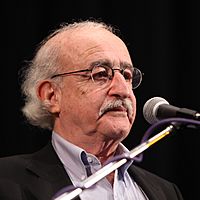Juraj Herz facts for kids
Quick facts for kids
Juraj Herz
|
|
|---|---|
 |
|
| Born | 4 September 1934 Kežmarok, Czechoslovakia (now Kežmarok, Slovakia)
|
| Died | 8 April 2018 (aged 83) |
| Occupation | Film director Screenwriter Actor |
| Years active | 1961–2018 |
Juraj Herz (born September 4, 1934 – died April 8, 2018) was a famous film director, actor, and scene designer from Slovakia. He was part of a special group of filmmakers called the Czechoslovak New Wave in the 1960s.
Herz is most famous for his 1969 movie, The Cremator. This film is a mix of horror and dark comedy. Many people say it is one of the best films ever made in Czechoslovakia. He also directed many other movies and TV shows that became very popular.
Contents
Early Life and Education
Juraj Herz was born in 1934 in Kežmarok, a town in what is now Slovakia. His family was Jewish. During his childhood, he was held in the Ravensbrück concentration camp. This was a very difficult time during the Holocaust. About 60 members of his extended family died, but his close family survived.
After finishing high school in Bratislava, he studied photography. Later, he went to the Theatre Faculty of the Academy of Performing Arts in Prague (DAMU). There, he learned how to direct films and work with puppets. He studied alongside another famous artist, Jan Švankmajer. After his studies, he stayed in Prague. He worked at the Semafor Theatre and Barrandov Studios.
Film Career Highlights
Juraj Herz learned how to direct films on his own. His first experiences in movies were as a second-unit director. He worked on films like Transport from Paradise (1962) and The Shop on Main Street (1965). Because he didn't go to the main film school (FAMU), he wasn't at first part of the core group of directors in the Czechoslovak New Wave. His short film The Junk Shop (1965) was not included in their famous collection of films.
The Cremator: A Famous Film
Herz became very well-known with his 1969 film, The Cremator. This movie was based on a book by Ladislav Fuks. It stars Rudolf Hrušínský as a crematorium manager who becomes very strange. He starts to help the Nazis during World War II.
The Cremator was chosen to represent Czechoslovakia at the Academy Award for Best Foreign Language Film. In 1972, it won the Best Film award at the Festival de Cine de Sitges. It also won awards for its main actor and cinematographer.
After it first came out, the Communist government immediately banned The Cremator. People in Czechoslovakia could not see it again until after the Velvet Revolution in 1989. However, it became very famous around the world. It is still seen as one of the best movies ever made in Czechoslovakia.
Other Notable Horror Films
Juraj Herz was especially known for his horror films. He was one of the few directors in Czechoslovakia who made horror movies during the Communist era. His other horror works include the 1972 murder drama Morgiana. He also directed a gothic version of the fairy tale Beauty and the Beast in 1978.
Herz's 1971 drama Oil Lamps was considered for the top award at the 1972 Cannes Film Festival. His 1976 film Day for My Love, which was about the death of a child, was shown at the 27th Berlin International Film Festival.
In 1982, he made Ferat Vampire (Czech: Upír z Feratu). This was a horror movie about a deadly sports car that ran on human blood. It starred Jiří Menzel and Dagmar Havlová, who later became the first lady. In 1986, Herz released The Night Overtakes Me. This sad drama was about his own experiences in the concentration camp.
Herz moved to Germany in 1987. His last major films were the paranormal thriller Darkness (2009) and Habermann (2010). Habermann was a war drama about Germans being forced to leave Czechoslovakia after World War II.
Filmmaking Style
Juraj Herz was very interested in making genre films, especially horror movies. He often used psychological horror in his films. This means he explored the minds of his characters to create fear. He also included ideas that went against the government in his movies. Herz believed that dark humor was a way to express himself. He felt that even serious films could have moments that made people laugh.
Death
Juraj Herz passed away in Prague on April 8, 2018. He was 83 years old. His death was announced by Slovak actor Andrej Hryc, who had worked with Herz for many years.
Selected Filmography
- The Junk Shop (Sběrné surovosti, 1965)
- The Sign of Cancer (Znamení raka, 1965)
- The Cremator (Spalovač mrtvol, 1969)
- Sweet Games of Last Summer (Sladké hry minulého léta, 1970)
- Oil Lamps (Petrolejové lampy, 1971)
- Morgiana (1972)
- Day for My Love (Den pro mou lásku, 1976)
- Beauty and the Beast (Panna a netvor, 1978)
- The Ninth Heart (Deváté srdce, 1979)
- Ferat Vampire (Upír z Feratu, 1982)
- The Night Overtakes Me (Zastihla Mě Noc, 1986)
- Darkness (T.M.A., 2009)
- Habermann (Habermannův mlýn, 2010)
See also
 In Spanish: Juraj Herz para niños
In Spanish: Juraj Herz para niños

